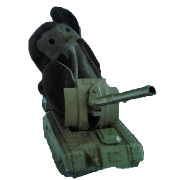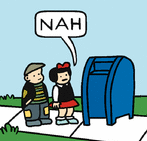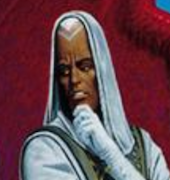|
vyelkin posted:I want a miniseries about the Russian Revolution starring Leonardo DiCaprio as Lenin will you accept patrick stewart? https://en.wikipedia.org/wiki/Fall_of_Eagles https://www.youtube.com/watch?v=XkY88kvkdvU
|
|
|
|

|
| # ? May 23, 2024 05:24 |
|
Suplex Liberace posted:ok thats good to know i found a cheap copy of his book on china restless empire i will check it out oh I haven't read that one so idk if it specifically is good but I like both The Cold War and The Global Cold War
|
|
|
|
What's the source for CIA involvement in the 1956 Hungarian revolution? I'm pretty sure it's come up in this thread before.
|
|
|
|
Oglethorpe posted:will you accept patrick stewart? Fall of Eagles is primo TV for an afternoon where you have a really bad wine hangover and it's cold and gray outside
|
|
|
|
Nice little article in the NLR blog marking the 100th anniversary of the March on Rome by noting how fascism was never socialist, it was always an illiberal way to preserve and advance liberal economics.quote:The Nightwatchman’s Bludgeon https://newleftreview.org/sidecar/posts/the-nightwatchmans-bludgeon
|
|
|
|
Teriyaki Hairpiece posted:What is your historical movie/tv show dream? I want a 13 episode miniseries about the Solomons campaign that alternates between an American perspective, a Japanese perspective, and a Guadalcanal islander perspective.
|
|
|
|
Punkin Spunkin posted:This isn't modern but I've always thought the diadochi saga is just waiting for somebody. You want game of thrones???? Sean Bean is too old to play Alexander in the first season. Alas.
|
|
|
|
Teriyaki Hairpiece posted:What is your historical movie/tv show dream? I want a 13 episode miniseries about the Solomons campaign that alternates between an American perspective, a Japanese perspective, and a Guadalcanal islander perspective. The Falkland islands from the POV of the penguins.
|
|
|
|
Orange Devil posted:Sean Bean is too old to play Alexander in the first season. Alas. Alexander could just be played by some hot Bulgarian model, just show him dying, possibly include the "to the strongest/to Craterus" final words. Or omit them because it's the TRUE story behind the legend.
|
|
|
|
Grevling posted:Alexander could just be played by some hot Bulgarian model, just show him dying, possibly include the "to the strongest/to Craterus" final words. Or omit them because it's the TRUE story behind the legend. cast someone specifically from north macedonia just to watch the fireworks
|
|
|
|
i say swears online posted:cast someone specifically from north macedonia just to watch the fireworks An ethnic Greek from North Macedonia.
|
|
|
|
One of the most fun parts about the early American Revolution was how the soldiers of the Continental Army all signed up for specific periods of service and when their enlistments expired, they mostly just peaced the gently caress out. John Glover was a general from Massachusetts, great commander, did all this hero poo poo, but he signed up for 18 months of war. The second the clock ran out on that 18 months he was like "Bye! I've got better things to do." And the Continental Army was at like their lowest point when he and his whole regiment left. He came back eventually but Washington had to beg him like a dog first.
|
|
|
|
All I'm saying is that no one questioned John Glover's patriotism then and he's still considered an American hero. Just a completely alien mindset to today.
|
|
|
|
can anyone recommend a book possibly in epub form about how kennedy was way less bellicose during the cuban missile crisis than the media was implying im positive that i read about this somewhere in particular the part about how adlai stevensons position was the one kennedy effectively ended up taking despite stevenson being widely mocked as a giant pussy at the time compared to kennedys incredibly sized penis but i cant for the life of me remember where
|
|
|
|
Orange Devil posted:Sean Bean is too old to play Alexander in the first season. Alas. Don't see why Alexander would be in it at all really. Teriyaki Hairpiece posted:All I'm saying is that no one questioned John Glover's patriotism then and he's still considered an American hero. Just a completely alien mindset to today. Troops are considered heroes when they never left the green zone. Nobody disparages them for leaving at the end of their term of service.
|
|
|
|
Weka posted:Don't see why Alexander would be in it at all really. You gotta show them all being on the same side before it becomes a free for all imo. Get that pathos in there.
|
|
|
|
Some Guy TT posted:can anyone recommend a book possibly in epub form about how kennedy was way less bellicose during the cuban missile crisis than the media was implying im positive that i read about this somewhere in particular the part about how adlai stevensons position was the one kennedy effectively ended up taking despite stevenson being widely mocked as a giant pussy at the time compared to kennedys incredibly sized penis but i cant for the life of me remember where JFK & The Unspeakable but I hope you have a lot of patience for Christian metaphors.
|
|
|
|
does anyone have any sources discussing the william hearst media empire making up stories about constant famines in the soviet union in the thirties i know this was something they did because i saw a communist comic strip make reference to it in a year where famines didnt happen but im struggling to find a source thats not like literal communist propaganda just an onlinearchive of the old hearst newspapers would probably turn something up real fast but i dont know where to find anything like that if its not literally inside a library supposedly the feb eighth 1935 issue of the chicago american had six million dying in soviet famine as its big headline with articles continuing on that subject for quite some time thereafter i dont think these can be referring to the holodomor in the past tense because surely holodomor boosters would bring it up all the time if it was but id still like to look at some myself to be sure or at least read something written by someone who has
|
|
|
|
Some Guy TT posted:can anyone recommend a book possibly in epub form about how kennedy was way less bellicose during the cuban missile crisis than the media was implying im positive that i read about this somewhere in particular the part about how adlai stevensons position was the one kennedy effectively ended up taking despite stevenson being widely mocked as a giant pussy at the time compared to kennedys incredibly sized penis but i cant for the life of me remember where the following is from "Brothers: The Hidden History of the Kennedy Years", by David Talbot quote:The Kennedys were aware that the calls for an all-out U.S. military invasion of Cuba would grow louder as the November elections drew closer. As Admiral Burke prepared to leave the Navy in summer 1961, eased out by the administration he had come to revile, JFK had called him into the Oval Office to debrief him about Cuba. The president surely realized that Burke was soon to become a political thorn in his side and he wanted to hear what his line of attack on Cuba would be. “He asked me if I thought we would have to go into Cuba,” Burke later recalled. “I said yes. He asked whether we could take Cuba easily. I said yes, but it was getting more and more difficult. He asked what did I think would happen if we attacked. I said all hell would break loose but that some day we would have to do it.” By the following year, Goldwater was declaring that “something must be done about Cuba…if it takes our military, I wouldn’t hesitate to use it.” ___ quote:IT WAS 9:45 ON the morning of Friday, October 19, 1962, four days after a U-2 spy plane had spotted several medium-range ballistic missile sites under construction in a remote area in the west of Cuba. The United States and Soviet Union were locked in the first week of the Cuban Missile Crisis, a thirteen-day dance of death that Arthur Schlesinger Jr. would later declare “the most dangerous moment in human history.” President Kennedy was straining to pick just the right steps in this tremulous choreography, so the world did not go stumbling over the nuclear edge. He and the two men who had emerged as his wisest advisors, his brother Bobby and Robert McNamara, were trying to steer the decision-making process toward the idea of a naval blockade of Cuba, to stop the flow of nuclear shipments to the island and to pressure the Soviets into a peaceful resolution of the crisis. But virtually his entire national security apparatus was pushing the president to take military action against Cuba. Leading the charge for an aggressive response were the members of the Joint Chiefs of Staff, who were urging the president to launch surprise air strikes on the island and then invade. On the morning of October 19, the nation’s top military commanders filed into the Cabinet Room to convince Kennedy to adopt their position. No meeting between a leader and his national security advisors has ever been so laden with consequence. And no meeting during the Kennedy presidency so dramatically illustrates the divisions between the head of state and his military chiefs.
|
|
|
|
gradenko_2000 posted:the following is from "Brothers: The Hidden History of the Kennedy Years", by David Talbot Now imagine Barack Obama in place of JFK
|
|
|
|
Honestly it is difficult to imagine any US president post Eisenhower and Kennedy from standing up to the joint chiefs like that. Even then LeMay was in for how many loving years? And a complete and total bloodthirsty psychopath for every single one of them. Apparently nobody had enough power to remove him.
|
|
|
|
Never forget that the US Congress did hearings wondering if Hollywood was making movies that were too anti-Nazi, in 1941
|
|
|
|
Orange Devil posted:Honestly it is difficult to imagine any US president post Eisenhower and Kennedy from standing up to the joint chiefs like that.
|
|
|
|
Teriyaki Hairpiece posted:Never forget that the US Congress did hearings wondering if Hollywood was making movies that were too anti-Nazi, in 1941 might you have any worthwhile articles or books to recommend on the subject
|
|
|
|
Teriyaki Hairpiece posted:Never forget that the US Congress did hearings wondering if Hollywood was making movies that were too anti-Nazi, in 1941 I read an account of the HUAC hearings and the red scare where one of the common accusations against people who were black listed was that they were "prematurely antifascist."
|
|
|
|
Weembles posted:I read an account of the HUAC hearings and the red scare where one of the common accusations against people who were black listed was that they were "prematurely antifascist." American volunteers who'd fought against Franco in the Spanish Civil war were rejected from joining the US military for that reason as well.
|
|
|
|
sullat posted:American volunteers who'd fought against Franco in the Spanish Civil war were rejected from joining the US military for that reason as well. was it for explicitly that reason? i figure joining another country's military would be a good reason to not let people sign up
|
|
|
|
i say swears online posted:was it for explicitly that reason? i figure joining another country's military would be a good reason to not let people sign up Problem: they wanted to keep the ones who had signed up with the British at a more politically-correct moment, or the nationalist Chinese at direct prompting to serve as a proxy force.
|
|
|
|
i say swears online posted:was it for explicitly that reason? i figure joining another country's military would be a good reason to not let people sign up I read an interview of a Spanish Civil war vet who had said that's what he was told after the war when he'd started asking around. He'd tried to join up in 1942 and was rejected, but by the time 1944 rolled around he'd been let in, probably because ideological purity wasn't as important as getting more meat for the grinder.
|
|
|
|
sullat posted:American volunteers who'd fought against Franco in the Spanish Civil war were rejected from joining the US military for that reason as well. A lot of countries made their Spanish Civil War Republican volunteers stateless.
|
|
|
|
I'm reading The Making of the President 1972, and it described the Merhige decision, handed down in January of that year. This was supposedly a case about school busing in Virginia: the racial make-up of students in Richmond used to be 60% white, 40% black, and so the busing program, of shifting students around so that public schools would have a relatively even racial make-up, worked. But then, as white folks started having their kids go to private schools, the percentages shifted to 70% black / 30% white, and so the case came up as a question of how should busing work in such conditions. Judge Merhige ruled that white students from as far as two counties away needed to be bussed into central Richmond, solely for the purpose of evening-out the racial make-up of the public schools. This rankled lots of folks, so the book goes, as they then had to see their children have to travel as far as 25 miles one way, just to abide by the Merhige decision. It was eventually reversed in June, but not before it had been implemented in so many other states (the book mentions that it was The main issue of the Florida democratic primary) that people remembered it and it colored their political positions even after it had gone away (and I assume busing reverted to some kind of state where they just made-do with whatever racial distribution they could manage?) I guess I'm just a little wary of the sheer ridiculousness of the narrative - Theodore H. White seems to be adopting the position in this book that the Democrats lost because they went too far to the left, and while I started reading* about the period precisely because I wanted to know more about it, I'm just having some skepticism over the charge that busing really went as far as he claims it did where you're shipping kids across county lines because of "activist judges". ___ * I specifically sought out this book because he wrote it well before the Watergate scandal really got going, because a lot of retrospectives on 1972 tend to get lost in the mire of Nixon winning because of CREEP and Watergate, or that they hardly ever bother talking about the campaign at all.
|
|
|
|
lol, fixing integration by bussing was an op designed to gently caress up, because they bussed white kids to the black schools that were made terrible intentionally.
|
|
|
|

|
|
|
|
If the Germans had won the Great War would they really have stomped the Bolsheviks or would they have kept them on as a client state, because in their mind such a revolutionary chaotic regime would keep Russia weak? Maybe they would exile Rosa and the Spartacists there as a safety valve for German society. It seems rather counterproductive that in most counterfactuals they fight a whole another war/counterinsurgency policing action to reinstall the White Russians who they had been fighting against previously. And they had sent Lenin there in the first place, they'd think he owes them!
|
|
|
|
wonder if germany won the civil war the uk would have tried harder/earlier in the russian civil war, especially if germany won pretty early on
|
|
|
|
I haven't read much about the western intervention on behalf of the White Russians, but weren't they pretty logistically constrained?
|
|
|
|
hey the czechoslovak legion went thousands of miles 
|
|
|
|
If the Germans had won WW1 it's not clear to me that the Bolsheviks would have come out on top in the civil war. A lot of it was fought in places Russia gave up in Brest Litovsk.
|
|
|
|
They could've won WWI after Brest-Litovsk (?) I guess my main question is whether or not Imperial Germany would have been interested in keeping the Bolsheviks around as a client regime, especially since the Allied powers would naturally support the White movement. It would be a pretty ironic situation. Maybe they'd send a "Bismarck legion" east to help the Soviets fight the Whites.
|
|
|
|

|
| # ? May 23, 2024 05:24 |
|
The Germans sent troops to fight the Bolsheviks in real life, so I don't think it's weird to imagine them fighting them harder if they won WW1. https://en.m.wikipedia.org/wiki/West_Russian_Volunteer_Army German friendly White Russian capitalists/aristocrats, of which there were plenty, would always have been a better bet than possibly temporarily German friendly bolsheviks
|
|
|


















